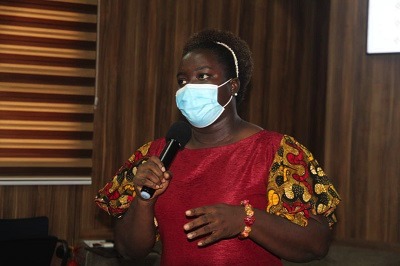Dr Afua Commeh
The Non-Communicable Diseases (NCDs) Control Programme of the Ghana Health Service (GHS) has appealed to the media to support its activities to help reduce the increasing incidence of NCDs in the country
According to the programme, the media’s role in shaping the lifestyle choices of the public towards healthy living is critical for the country’s NCDs control activities.
NCDs are non-infectious health conditions that cannot be spread from person to person but last long in an individual.
Globally, NCDs account for about 70 per cent of all deaths, with Ghana recording an estimated 96,000 deaths from NCDs annually, the programme stated.
It added that a total of 15, 802 people died from cancer diseases in Ghana in 2021 while 24,009 new cases were recorded within the same year.
Thus, liver cancer topped the list of 10 leading cancer deaths recorded last year, followed by breast, cervix uteri, prostate, non-hodgkin lymphoma, stomach, ovary, lung, leukemia, and cancer of the Oesophagus in that order.
Similarly, over 600,000 cases of hypertension and 200,000 diabetes cases were recorded in health facilities in 2021escalating the burden of non-communicable diseases (NCDs) in the country.
The Deputy Director-General of GHS, Dr. Anthony Ofosu, speaking at a media engagement in Accra indicated that most NCD cases were detected late, resulting in poor outcomes such as strokes, heart attacks, and even deaths.
“To address this worrying trend, stakeholders must be continuously engaged to find workable solutions, to help alleviate the rising burden of NCDs in the country,” he stated.
Dr. Ofosu implored the media to use their platform to intensify education on NCDs to reduce the burden in Ghana, saying, “early detection saves lives.”
Acting Programme Manager, Dr. Efua Commeh said hypertension accounts for more than 43 per cent of all deaths in the country with the Ashanti region reporting the highest Outpatient Department (OPD) hypertension cases in 2021.
“In one month, 71,378 people were diagnosed with hypertension and this can be attributed to multiple complex socio-economic and demographic factors,” she stated.
Dr. Commeh mentioned risk factors including unhealthy eating habits, physical inactivity, harmful use of alcohol, tobacco use, and air pollution as contributing to hypertension among the population.
She said the nature of NCDs requires that people are health conscious, adopt healthy lifestyles, eat healthily, and make regular check-ups at health facilities a routine, to reduce exposure.
By Jamila Akweley Okertchiri


